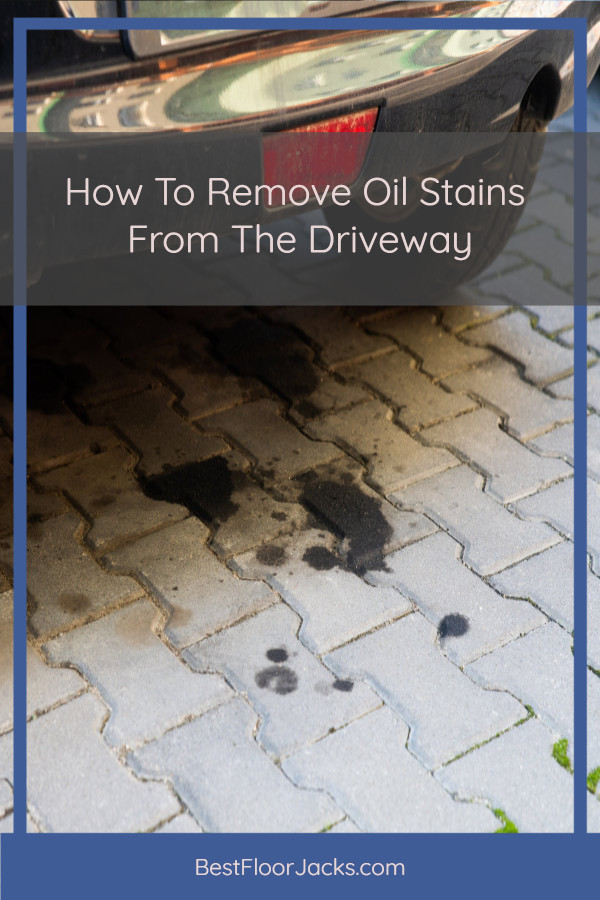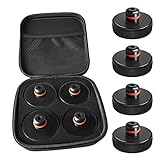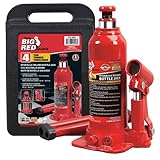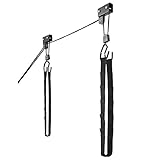
It doesn’t matter how careful you are, automotive work is bound to leave some sort of evidence on your driveway. If you have a new driveway or a paver driveway, this can be heartbreaking. Don’t shed any tears just yet, though, because there are several ways to remove oil stains from your driveway that only require a few household items and some elbow grease. This article will cover five of the top solutions to remove oil stains from your driveway.
For Small Droplet Removal
In the case of oil droplets that are smaller than a quarter, you may be able to remove the oil stains with a simple baking soda and hot water treatment. First, blot up any excess oil with a paper towel. Make a simple paste of baking soda and hot water. Apply the paste directly to the oil stain, then use a stiff brush dipped in hot water to scrub the paste into the oil stain. Allow the paste to stand on the oil stain at least 8 hours. Then, wash the area thoroughly with hot water until all of the baking soda has been washed away. If the oil stain isn’t completely removed with the first treatment, wait until the area is dry, then reapply the paste and perform the steps from beginning to end again.
For Larger Spots Or Puddles
In the case of puddles of oil, or bigger spills, first start by blotting up all of the excess oil from the area with paper towels. Then, take a scoop of kitty litter and cover the oil stain completely with the litter. Continue applying kitty litter until all of the oil is covered by litter. Stomp the litter down onto the oil stain to ensure that it is beginning cohesion with the oil spot. Allow the kitty litter to sit and soak the oil overnight. Sweep the litter away, then hose off the area thoroughly. Next, squirt dish soap directly onto the oil stain. Dip a stiff scrub brush into hot water, then begin to scrub the dish soap into the oil stain. Continue scrubbing until the stain appears to have been completely scrubbed away. Rinse with hot water until all of the dish soap has been rinsed off of the area. If the oil stain isn’t completely washed away the first time, you can repeat the entire process again once the area has dried.
For Oil Stains On Pavers
If you have oil stains of any size on your pavers, you need to begin the cleanup procedure as quickly as possible. Pavers are incredibly porous, and that means that most stains won’t fully be removed once they have been absorbed by the paver material. Start by blotting any excess oil up with paper towels. Then, cover the entire affected area with sawdust. Let the sawdust sit and absorb the oil overnight. Sweep the sawdust up, then rinse the area. Pour dish soap directly onto the stained areas of the pavers. Dip your stiff scrub brush into hot water, and begin to scrub the dish soap into the stain vigorously. Once all of the dish soap has been scrubbed into a lather, rinse the entire area with hot water.
If any of the oil stain remains after the initial treatment, make a detergent paste. Start by taking powdered laundry detergent, and mixing in hot water until it forms a medium density paste. Apply the paste directly onto the stained areas of the pavers. Using your stiff scrub brush dipped in hot water, scrub the paste into the pavers thoroughly. Allow it to sit with the paste scrubbed into the paver overnight. Rinse the entire area with hot water. You may repeat this entire process from beginning to end until the stain is completely gone.
- Restore Natural Concrete Color – This concrete driveway cleaner uses microbes to break down hydrocarbon chains within petroleum oil to lift away deep concrete stains caused by gas, diesel, oil,...
- Powerful and Environmentally Safe – EXIMO concrete cleaner solution is a natural, waterless formula that’s tough on stains but safe for surrounding plant life, grass, your family, and even pets...
- Multipurpose Surface Cleaner – Our concrete surface cleaner can be used on a wide range of outdoor areas, including your driveway, sidewalks, parking lots, cement or concrete patios, entry stairs,...
- Wet or Dry Application – Easier to use than a pressure washer or power cleaner our concrete driveway can be applied on wet or dry surfaces. Just apply, leave on surface – no need to sweep up, or...
- Trusted Quality Satisfaction – Here at CAF Outdoor Cleaning we create the highest quality concrete cleaner possible which is why it comes backed by our responsive support and unbeatable customer...
For Oil Stains That Are Stubborn Or Set In
If you are trying to combat set in oil stains, or oil stains that just refuse to budge with any of the other treatments, it may be time to pull out the big guns. Coca Cola is one of the most caustic substances that you will find in your home. It can dissolve bone that is left standing in a bucket of Coca Cola. However, it is great at removing set in or super stubborn stains from grout, caulk, porcelain, concrete, paver stone, and many other surfaces.
Start by blotting up any excess oil with paper towels. Then, pour Coca Cola directly onto the oil stain, thoroughly covering the stain with the soda. Use it liberally. Leave the Coca Cola on the stain for at least 8 hours. Then, rinse the entire area with hot water. You may need to do this procedure more than once in order to remove the entire stain.
For Oil Stains That Are Super Stubborn
If you have tried every other product on this list and nothing is getting the oil stain to break up for removal, you can resort to engine degreaser. You want to begin by blotting any excess oil away with a paper towel. Then, apply the degreaser directly to the oil stain, thoroughly saturating the entire stain with the degreaser. Allow it to sit at least 8 hours. After the 8 hours has passed, rinse the area thoroughly with hot water. If it doesn’t completely alleviate the oil stain the first time, allow the area to dry, then reapply and start this process all over again.
The Absolute Nuclear Treatment
If you have tried this entire list, yet an oil stain just absolutely refuses to budge, there is one last item that is capable of cleaning the oil up, but it needs to be used with the utmost caution. Muriatic acid is capable of cleaning almost anything, but it is so dangerous to both eyes and skin, you need to put on your protective gear prior to even opening the container.
Prep the area like you’ve done with all of the other treatments by using paper towels to absorb any remaining oil from the area. Then, mix 1 part muriatic acid with 9 parts water. Pour this mixture directly onto the stain, and wait for it to stop fizzing. This typically will take around ten minutes or so. Once it is done fizzing, rinse the entire area very thoroughly with hot water until the water runs absolutely clear off of the area. It is not recommended to use muriatic acid treatment more than once on a single area. That is simply because it is very corrosive in nature, and will kill any surrounding insect life, grass, or plants that may be near.
Commercial Concrete Cleaners
There are many products on the market that are listed as cleaners for oil on concrete, or other hazardous spill clean up agents. The truth of the matter is that the commercial cleaners are typically a combination of one or more of the agents on this list. The higher the caustic quality, the better it removes material that penetrates a surface immediately, such as motor oil.
Do not try to combine your own caustic chemicals at home. This can result in you receiving serious burns or injuries, because caustic chemicals can react in very unexpected and dangerous ways when they are combined. Even combining small amounts of caustic chemicals in well ventilated areas is never a good idea. It can result in serious injury or even death.
If you decide to try more than one of the cleaners listed above, use one at a time, and complete the entire cleaning process from beginning to end prior to moving on the next product. If it looks as though a product is working, and the stain may come up with one more treatment, stick with that product, and see what another cleaning with the same product will do. There is no sense in moving to a more caustic chemical if you don’t have to in order to remove the stain.
The important part is to try to immediately blot as much of the oil from the concrete prior to applying anything else to the area. Then, rely on your kitty litter or sawdust to do a great deal of the work for you. Only after you’ve allowed the litter or sawdust to siphon up the majority of the liquid do you want to start applying any sort of caustic chemical to the area. Start with the least caustic item here, dish soap and a scrub brush, and then work your way into a heavier cleaner like detergent, soda, or engine degreaser. If you don’t have to pollute the immediate area with caustic chemicals, you certainly don’t want to . Any of the caustic chemicals on this list will kill your grass and any plant life that is feeding from your rinse water, so you’ll want to be mindful of that as well. You don’t want to kill an entire yard full of sod by rinsing muriatic acid all over your lawn trying to clean the concrete.
- Powerful grease remover and grime fighter in a biodegradable bio-solvent formula with durable, shatter-resistance trigger and convenient refill port; no funnel needed and no-mess
- Safe to use on multiple surfaces. Unlike other degreasers, this formula will prevent glass from etching and aluminum, copper, and metal from corroding and flash rust
- Non-flammable, non-corrosive, non-abrasive, low-odor formula that can be used in food-processing facilities
- Biodegradable formula meets U.S. EPA Safer Choice Standards and is 50-state VOC compliant. NSF Registered A1, A2, A4, A8, B1
- Excellent for cleaning greasy automotive parts, tools, shop floors, industrial machinery, commercial appliances, and equipment







